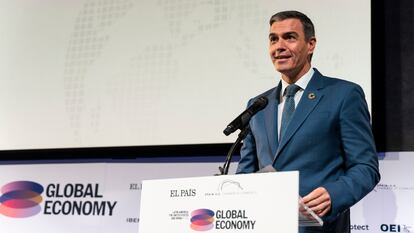Spanish PM Sánchez in New York: ‘Europe needs reforms to avoid falling behind in the most cutting-edge technological sectors’
At an EL PAÍS forum, the leader called for increased public investment, arguing it has had a more positive effect on the economy than the ‘neoliberal dogma’ seen during austerity

Spanish Prime Minister Pedro Sánchez is brimming with optimism about the economy on his seventh trip to New York to participate in the U.N. General Assembly. During his speech at the forum Latin America, the United States and Spain in the Global Economy — organized by EL PAÍS and the Spain-U.S. Chamber of Commerce, and sponsored by DLA Piper, Iberia, Inditex, Indra, NTT Data and Total Protect in collaboration with the Organization of Ibero-American States (OEI) — Sánchez even joked about the fact that in Spain no one talks about positive data, so he wanted to be clear: “Spain is experiencing one of the best moments in recent decades, this must also be said abroad.”
At the forum, Sánchez defended his government’s policies and, above all, its commitment to public investment and stepping in to improve markets facing challenges, such as the energy market. It’s an approach that contrasts to the “neoliberal dogma” that, in his opinion, failed in the previous decade, when authorities in Europe implemented sweeping austerity policies.
In a context in which world leaders such as Argentine President Javier Milei, as well as former U.S. president Donald Trump, are leading a crusade against the state, Sánchez defends the opposite and is seeking to become a benchmark that shows that social democratic policies are more successful economically. In his opinion, after six years in government — first led by the Spanish Socialist Party (PSOE), then in a coalition with Unidas Podemos — the data from Spain shows that this is the case.
Sánchez has drawn important supporters to this camp, including Mario Draghi, former president of the European Central Bank (ECB) and former Italian prime minister, whose much-anticipated report on the future of European competitiveness for the European Commission calls for increased public investment.
“Our country paid a high price under the neoliberal dogma of austerity,” said Sánchez at the forum. “We lost precious time, and today the European Union as a whole is paying the consequences. Europe must increase public investment, not reduce it. Europe must involve the state in the generation of wealth, not push it aside. In our country, we have been applying these policies for six years. And now we know that they work, even in a complex international context marked by uncertainty. We must redouble public investment in technology, innovation and ecological transition, promoting public-private collaboration as we have been doing. Only in this way will we be able to make up for the time lost in the past decade and move forward with a firm step.”
“We must face the challenge of improving competitiveness in line with the main recommendations of the Draghi report, which Spain fully shares,” he continued. “Europe needs reforms to avoid falling behind in the most cutting-edge technological sectors, and it must also make better use of all the instruments at its disposal to strengthen its strategic autonomy and guarantee its economic security. But it also needs more public investment: in research, in the development of new technologies and in green infrastructure. This is the path followed by Spain in recent years, doubling public investment in R&D and allocating two out of every five euros of the Recovery Plan to the ecological transition.”
As proof of the success of his government’s market intervention and public-private collaboration, Sánchez cites the results of energy prices. “Spain suffered a tremendous shock from the Covid-19 pandemic. Four years later, we are leading the growth of the major European economies, and the real income of Spaniards is growing faster than that of Germans or Italians. Today we have updated the forecasts, we are expecting strong growth,” he explained.
Sánchez said this move had helped address rising inflation: “Since the beginning of this episode of rising prices, cumulative inflation in the EU is 18.9%, almost 4.5 points higher than in Spain. This difference is largely explained by the energy component. Let us consider that, compared to 2021, while electricity is almost 33% more expensive on average in the countries of the eurozone, in Spain, it is 13.6% cheaper than then,” the prime minister said.
Sánchez also claimed that all the reforms being carried out in Spain, including pension reform, are being done by agreement, which is unusual in Europe. “We have made social peace a hallmark of Spain,” he insisted, adding that, according to the Gini index, inequality has also fallen in Spain,
Sign up for our weekly newsletter to get more English-language news coverage from EL PAÍS USA Edition
Tu suscripción se está usando en otro dispositivo
¿Quieres añadir otro usuario a tu suscripción?
Si continúas leyendo en este dispositivo, no se podrá leer en el otro.
FlechaTu suscripción se está usando en otro dispositivo y solo puedes acceder a EL PAÍS desde un dispositivo a la vez.
Si quieres compartir tu cuenta, cambia tu suscripción a la modalidad Premium, así podrás añadir otro usuario. Cada uno accederá con su propia cuenta de email, lo que os permitirá personalizar vuestra experiencia en EL PAÍS.
¿Tienes una suscripción de empresa? Accede aquí para contratar más cuentas.
En el caso de no saber quién está usando tu cuenta, te recomendamos cambiar tu contraseña aquí.
Si decides continuar compartiendo tu cuenta, este mensaje se mostrará en tu dispositivo y en el de la otra persona que está usando tu cuenta de forma indefinida, afectando a tu experiencia de lectura. Puedes consultar aquí los términos y condiciones de la suscripción digital.









































